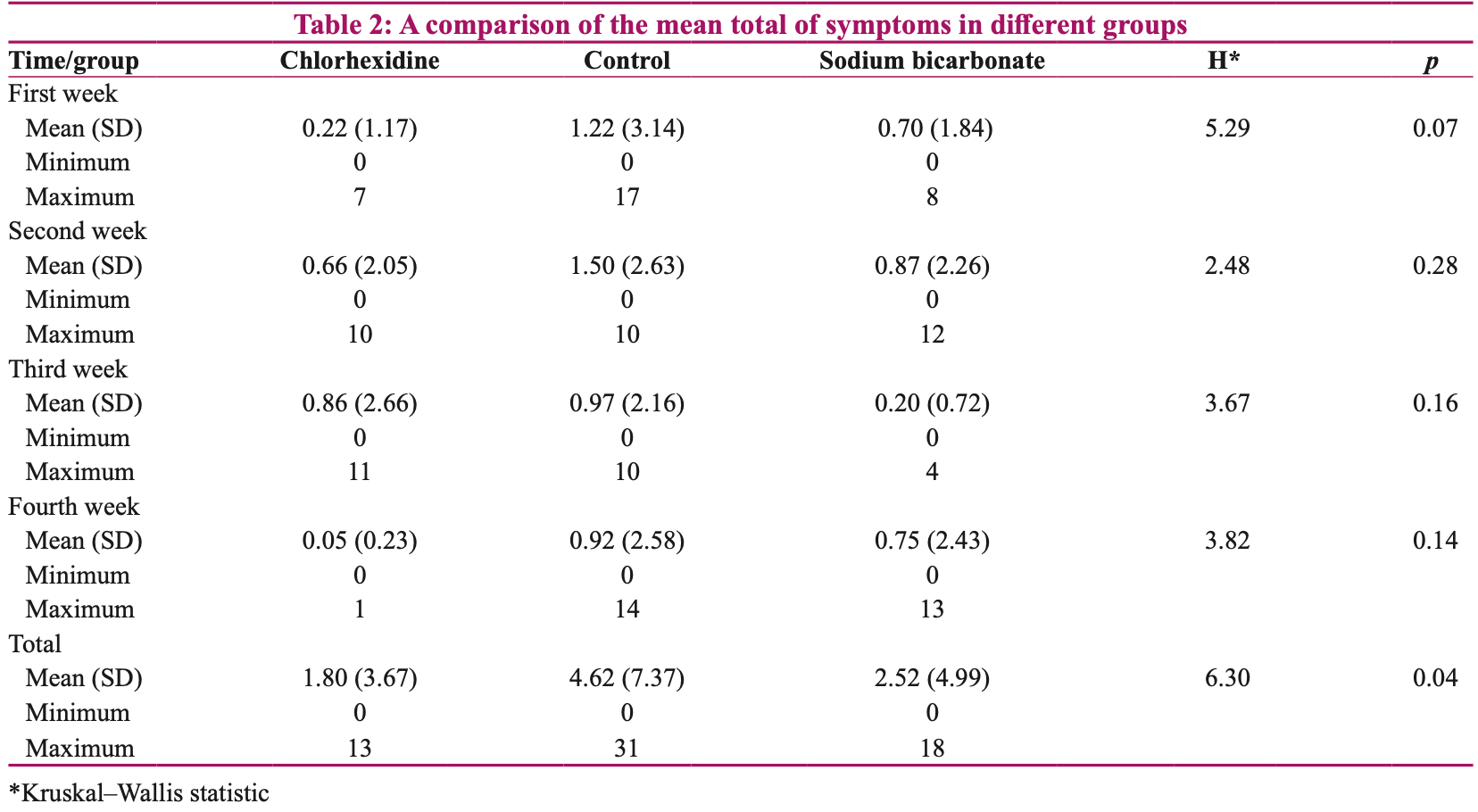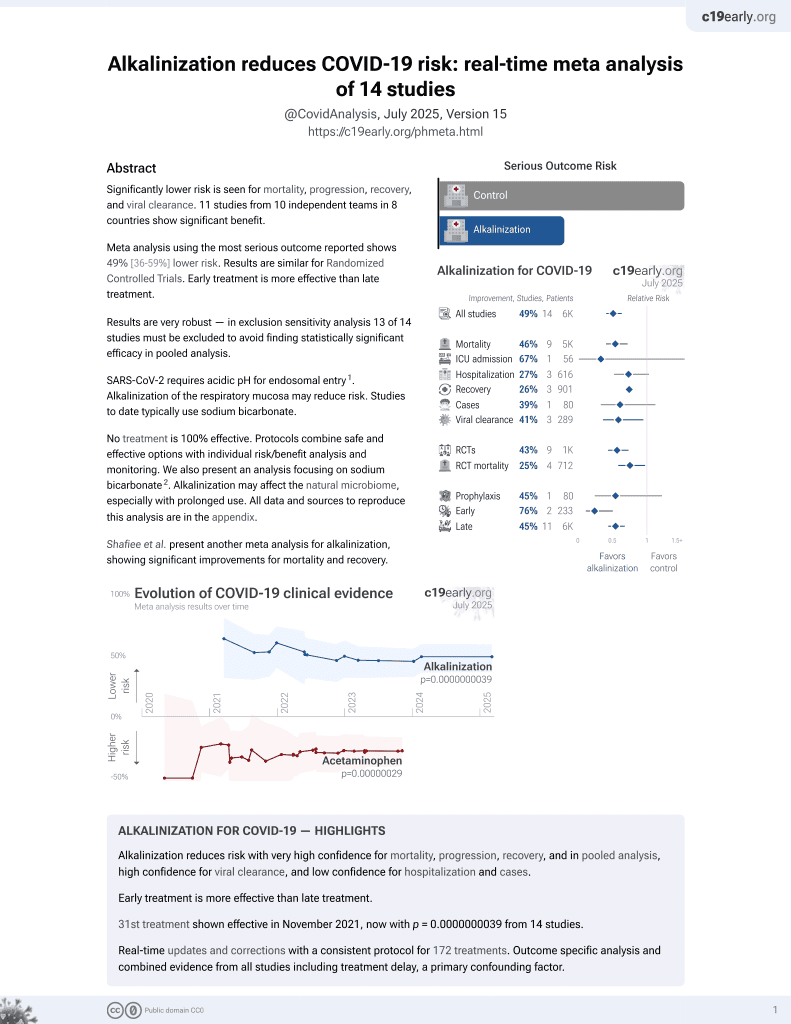
A Comparison of the Effects of Chlorhexidine and Sodium Bicarbonate Mouthwashes on COVID-19–Related Symptoms
et al., Iranian Journal of Nursing and Midwifery Research, doi:10.4103/ijnmr.ijnmr_38_23, IRCT20220328054364N1, Jan 2024
31st treatment shown to reduce risk in
November 2021, now with p = 0.0000000039 from 14 studies.
No treatment is 100% effective. Protocols
combine treatments.
6,400+ studies for
210+ treatments. c19early.org
|
RCT 116 healthcare workers comparing 0.2% chlorhexidine mouthwash (n=36), 7.5% sodium bicarbonate mouthwash (n=40), and placebo (n=40) twice daily for 2 weeks, with symptoms followed for 4 weeks. There were lower symtoms and cases in both treatment groups, with statistical significance for chlorhexidine only. The treatments were stopped after two weeks, results may be better with continued use, more frequent use, and with the addition of nasal use.
Targeted administration to the respiratory tract provides treatment directly
to the typical source of initial SARS-CoV-2 infection and replication, and
allows for rapid onset of action and reduced systemic side effects.
Study covers chlorhexidine and alkalinization.
|
relative mean total symptoms, 45.5% better, RR 0.55, p = 0.14, treatment mean 2.52 (±4.99) n=40, control mean 4.62 (±7.37) n=40.
|
|
relative mean week 1 symptoms, 42.6% better, RR 0.57, p = 0.39, treatment mean 0.7 (±1.84) n=36, control mean 1.22 (±3.14) n=40.
|
|
relative mean week 2 symptoms, 42.0% better, RR 0.58, p = 0.27, treatment mean 0.87 (±2.26) n=36, control mean 1.5 (±2.63) n=40.
|
|
relative mean week 3 symptoms, 79.4% better, RR 0.21, p = 0.045, treatment mean 0.2 (±0.72) n=36, control mean 0.97 (±2.16) n=40.
|
|
relative mean week 4 symptoms, 18.5% better, RR 0.82, p = 0.77, treatment mean 0.75 (±2.43) n=36, control mean 0.92 (±2.58) n=40.
|
|
risk of case, 38.9% lower, RR 0.61, p = 0.16, treatment 11 of 40 (27.5%), control 18 of 40 (45.0%), NNT 5.7.
|
| Effect extraction follows pre-specified rules prioritizing more serious outcomes. Submit updates |
Karami et al., 9 Jan 2024, Double Blind Randomized Controlled Trial, Iran, peer-reviewed, 4 authors, study period July 2022 - October 2022, trial IRCT20220328054364N1.
A Comparison of the Effects of Chlorhexidine and Sodium Bicarbonate Mouthwashes on COVID-19-Related Symptoms
doi:10.4103/ijnmr.ijnmr_38_23
Background: Some studies have reported that mouthwashes can decrease the viral load in the mouth, but there is not much information about the effectiveness of mouthwashes on coronavirus disease 2019 (COVID-19). This study was conducted to compare the impact of using two types of mouthwash, chlorhexidine and sodium bicarbonate, on COVID-19 symptoms and infection. Materials and Methods: The present three-group, double-blind clinical trial examined 116 operating room nurses and anesthesia personnel of certain hospitals of Isfahan University of Medical Sciences, Isfahan, Iran. The participants were randomly assigned to three groups: intervention group 1 (chlorhexidine mouthwash), intervention group 2 (sodium bicarbonate mouthwash), and the control group (placebo). Mouthwash was used twice a day (morning and night) for 2 weeks. The participants were monitored in terms of COVID-19-related symptoms for 4 weeks, from the first day of mouthwash use. Results: Fisher's exact test indicated a significant difference between the chlorhexidine and control groups in terms of the onset of COVID-19-related symptoms (p = 0.02). There was no significant difference in the symptoms of COVID-19 between the groups, but the groups were significantly different in terms of all symptoms at a 4-week interval (p = 0.04). Furthermore, headache was less observed in the chlorhexidine (p = 0.007) and sodium bicarbonate (p = 0.03) groups compared to the control group. Conclusions: The use of 0.2% chlorhexidine mouthwash can decrease the onset of COVID-19-related symptoms in health-care workers. In addition, this mouthwash can partially reduce the symptoms of this disease in comparison to the control and sodium bicarbonate groups.
Conflicts of interest Nothing to declare.
References
Ali, Alharbi, COVID-19: Disease, management, treatment, and social impact, Sci Total Environ
Alshamrani, El-Saed, Zunitan, Almulhem, Almohrij, Risk of COVID-19 morbidity and mortality among healthcare workers working in a large tertiary care hospital, Int J Infect Dis
Awadasseid, Wu, Tanaka, Zhang, Current advances in the development of SARS-CoV-2 vaccines, Int J Biol Sci
Barouch, Covid-19 vaccines-immunity, variants, boosters, N Engl J Med
Bergwerk, Gonen, Lustig, Amit, Lipsitch et al., Covid-19 breakthrough infections in vaccinated health care workers, N Engl J Med
Huang, Huang, Use of chlorhexidine to eradicate oropharyngeal SARS-CoV-2 in COVID-19 patients, J Med Virol
Jain, Grover, Singh, Sharma, Das et al., Chlorhexidine: An effective anti-COVID mouth rinse, J Indian Soc Periodontol
Karpiński, Szkaradkiewicz, Chlorhexidine-pharmacobiological activity and application, Eur Rev Med Pharmacol Sci
Khoshkam, Aftabi, Stenvinkel, Lawrence, Rezaei et al., Recovery scenario and immunity in COVID-19 disease: A new strategy to predict the potential of reinfection, J Adv Res
Kim, Chin, Kang, Kim, Kang et al., Clinical course and outcomes of patients with severe acute respiratory syndrome coronavirus 2 infection: A preliminary report of the first 28 patients from the Korean cohort study on COVID-19, J Korean Med Sci
Kumar, Kumar, Mahto, Singh, Gargling with 7.5% sodium bicarbonate solution for sars-cov-2 viremia clearance: Our institutional clinical experience, Indian J Crit Care Med
Madeswaran, Jayachandran, Sodium bicarbonate: A review and its uses in dentistry, Indian J Dent Res
Meng, Hua, Bian, Coronavirus disease 2019 (COVID-19): Emerging and future challenges for dental and oral medicine, J Dent Res
Mir, Mansoor, Bhat, Rehman, Ahmad et al., Lysosomotropic properties of sodium bicarbonate and covid-19, Farmacia
Moosavi, Aminishakib, Ansari, Antiviral mouthwashes: Possible benefit for COVID-19 with an evidence-based approach, J Oral Microbiol
Mottaghi, Mianehsaz, Prophylactic effects of mouthwashes on covid-19 and its family viruses: A systematic review, Qom Univ Med Sci J
Najafi, Taheri, Mokhtari, Forouzanfar, Farazi et al., Comparative study of 0.2% and 0.12% digluconate chlorhexidine mouth rinses on the level of dental staining and gingival indices, Dent Res J
Paula, Corrêa, Heller, Daep, Benitez et al., Salivary SARS-CoV-2 load reduction with mouthwash use: A randomized pilot clinical trial, Heliyon
Siahpoosh, Habibi, Nasrabadi, Doubts about the Effectiveness of Baking Soda Inhalation on Improving Respiratory Symptoms in COVID-19 Patients: A Review Article, Internet
Vergara-Buenaventura, Castro-Ruiz, Use of mouthwashes against COVID-19 in dentistry, Br J Oral Maxillofac Surg
Walls, Park, Tortorici, Wall, Mcguire et al., Structure, function, and antigenicity of the SARS-CoV-2 spike glycoprotein, Cell J
Xu, Li, Gan, Du, Yao, Salivary glands: Potential reservoirs for COVID-19 asymptomatic infection, J Dent Res
Yang, Liu, Liu, Zhang, Wan et al., COVID-19: Immunopathogenesis and Immunotherapeutics, Signal Transduct Target Ther
Yang, Xie, Li, Understanding the mechanisms for COVID-19 vaccine's protection against infection and severe disease, Expert Rev Vaccines
Yoon, Yoon, Song, Yoon, Lim et al., Clinical significance of a high SARS-CoV-2 viral load in the saliva, J Korean Med Sci
Yuki, Fujiogi, Koutsogiannaki, COVID-19 pathophysiology: A review, Clin Immunol
Zamani, Zamani, Jouzi, The effect of inhalation of sodium bicarbonate (soda fumigation) on the respiratory complications of Covid-19 disease: A review study
Zou, Chen, Zou, Han, Hao et al., Single-cell RNAseq data analysis on the receptor ACE2 expression reveals the potential risk of different human organs vulnerable to 2019-nCoV infection, Front Med
karami
